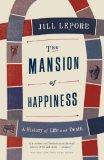Summary | Excerpt | Reviews | Beyond the Book | Readalikes | Genres & Themes | Author Bio

Critics' Opinion:
Readers' Opinion:
First Published:
Jun 2012, 320 pages
Paperback:
Mar 2013, 320 pages
 Book Reviewed by:
Book Reviewed by:
Elizabeth Whitmore Funk
Buy This Book
That life's a game, divines confess;
This says at cards, and that at chess;
But if our views be center'd here, '
Tis all a losing game, I fear.
The New Game of Human Life showed up in the United States not long after George Washington was inaugurated, and it was still being played as late as the 1870s; although, by then, an essayist who wrote about it made it sound quaint, an antique game played "on a queer old parchment." The fearsome hand of providence made the New Game of Human Life, by latter-day board game standards, unbearably dull. There's no strategy, just dutiful to-ing and fro-ing, in abject obedience to the roll of the die and the rules of the game. Even worse, there's a dispiriting absence of adversaries; you're racing against other players, but you're not competing with them,
not the way you are in, say, Monopoly, when you get to charge them exorbitant rents. And, as for parents offering up "a few moral and judicious observations" at each square, I have tried this - giving my best impression of an eighteenth-century father - and all I can say is: no dice. When my six-year-old landed on the Docile Boy, I asked him, "Do you know what ‘docile' means?"
"No."
"It means you should do what I say, you little blister."
"Oh yeah?" He narrowed his eyes. "Your roll."
Two more games of life, the Mansion of Bliss and the Mansion of Happiness, were both produced in England beginning around 1800. They look a lot like the New Game of Human Life: spiral race games adapted to the pilgrimage of life. Both represent immortality, life's final destination, as a heavenly mansion; this was then a popular Christian conceit, taken from John 14:2: "In my Father's house are many mansions." "O Lord! deliver us from sin," prayed one American evangelical in 1814, "and when we shall have finished our earthly course, admit us to the mansion of bliss and happiness." Or, as the rules to the Mansion of Bliss had it:
Who enter the mansion of bliss,
Will have cause to rejoice at his claim;
So well has he travell'd thro' life,
He has happily ended the game.
In the United States, the Mansion of Bliss never really made a mark, maybe because the phrase "the mansion of bliss" was also used by Americans to refer to an especially alluring woman's breasts. But the Mansion of Happiness, the most popular board game in Britain, had an extraordinarily successful American career. It was sold in the United States at least as early as 1806. In 1843, an American edition, based on revisions to the English game made by Anne Wales Abbott, the editor of a Boston-based juvenile magazine called the Child's Friend, was offered by W. and S. B. Ives, a printing company in Salem. In ten months, Ives sold nearly four thousand of what went on to become the century's most enduring game. It became a staple of Victorian parlors; it made its way west on the Overland Trail.
The Mansion of Happiness is abundantly pious. Its rules begin:
At this amusement each will find
A moral fit t'improve the mind;
It gives to those their proper due,
Who various paths of vice pursue,
And shows (while vice destruction brings)
That good from every virtue springs.
Be virtuous then and forward press,
To gain the seat of happiness.
You can hear, in these lines, echoes of the earliest Puritan primers: "In Adam's fall, we sinned all." And the last couplet alludes, quite particularly, to the beginning of John Milton's Paradise Lost (1667), in which Man waits for the son of God to "Restore us, and regain the blissful seat."
Excerpted from The Mansion of Happiness by Jill Lepore. Copyright © 2012 by Jill Lepore. Excerpted by permission of Knopf, a division of Random House, Inc. All rights reserved. No part of this excerpt may be reproduced or reprinted without permission in writing from the publisher.





The Funeral Cryer by Wenyan Lu
Debut novelist Wenyan Lu brings us this witty yet profound story about one woman's midlife reawakening in contemporary rural China.
Your guide toexceptional books
BookBrowse seeks out and recommends the best in contemporary fiction and nonfiction—books that not only engage and entertain but also deepen our understanding of ourselves and the world around us.